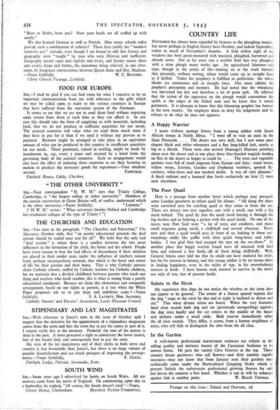COUNTRY LIFE
NOVEMBER has always been regarded by farmers as the ploughing month ; but never perhaps in English history have October, and indeed September, stolen so much of November's thunder. A field within sight of my windows has been green-manured with mustard, ploughed, harrowed and already sown. Not so far away was a stubble field that was ploughed with a skim plough many weeks ago. An agricultural labourer—old type, though in the prime of life—looking on at the work foretold that presently, without sowing, wheat would come up in straight lines as if drilled. Today his prophecy is fulfilled to perfection: the wheat blades are continuous and in straight lines. One must admire the prophet's perception and memory. He had noted that the wheatcrop was harvested too late and therefore a lot of grain spilt. He inferred that the action of the apparatus on the plough would concentrate the spilth at the edges of the folded sods and he knew that it would germinate. It is pleasant to know that this labouring prophet has honour in his own county. No employer dares to deny his judgement and he refuses to do what he does not approve.
A Happy Warrior I quote without apology letters from a young soldier with South African troops in North Africa. " I went off to visit an oasis in the Sinai Peninsula. . . . The desert was very dull; but I saw some most elegant black and white wheatears and a fine long-billed lark, nearly as big as a thrush. There were also several Montagu's Harriers prowling about over the desert and at one place three blue-headed wagtails feeding on flies in the desert as happy as could be. . . . The trees and vegetable gardens were full of small migrants from Europe and Asia: wood wrens, willow wrens, Icterine, Garden and Orphaean warblers, spotted fly- catchers, whin-chats and one masked shrike. It was all very pleasant." A black redstart and a buzzard that feeds exclusively on bats (!) were seen elsewhere.
The Poor Quail Here is a passage from another letter which perhaps may persuade some London gourmets to refuse quail for dinner. " All along the shore were stretched nets for catching quail as they come in from the sea. There are always two nets together, one with a small, one with a big mesh behind. The quail fly into the small mesh forcing it through the big meshes and so forming a pocket with the quail inside. On one of the meres near Port Said were " a lot of terns and swallows, and many small migrants going south, a chiffchaff and several wheatear. Every now and then a quail would pass in front of us, looking in those sur- roundings oddly like puffin with their quick wing-beats and tubby bodies. I was glad they had escaped the nets on the sea-shore." In another place this happy warrior found trees all smeared with bird lime and released a few birds, all of them being chiffchaffs. Well, General Smuts once told me that he could not have endured his trials, but for his interest in botany, and this young soldier is by no means alone in finding happiness, even in the midst of war, in his overwhelming interest in birds. I have known such interest to survive in the midst not only of war, but of present battle.
Salute to the Siren
My experience that dogs do not notice the wireless or the siren does not appear to be general. The owner of a Sussex spaniel reports that the dog " sings to the siren by day and at night is inclined to shiver and cry." This when distant sirens are heard. When the very fearsome local siren sounds both dog and cat (previously unregarding) squirm ; the dog cries loudly and the cat retires to the middle of the house and shelters under a small table. Both recover immediately when the all clear sounds. They differ, it seems, from a human neighbour of mine, who still fails to 'distinguish the alert from the all clear.
In the Garden
A well-known professional nurseryman endorses my tribute to the selling quality and intrinsic beauty of the Caucasian Scabious in its newest forms. He puts the variety Clive Greaves at the top. Those country house gardeners who sell flowers—and their number rapidly increases—may not know that from January next their gardens may technically come under the Horticultural Cropping Order which at present forbids the unfortunate professional growing flowers for sale but leaves the amateur a free hand. Whether it can or will be enforced against him is another point. W. BEACH THOMAS.
Postage on this issue : Inland and Overseas, id.


























 Previous page
Previous page